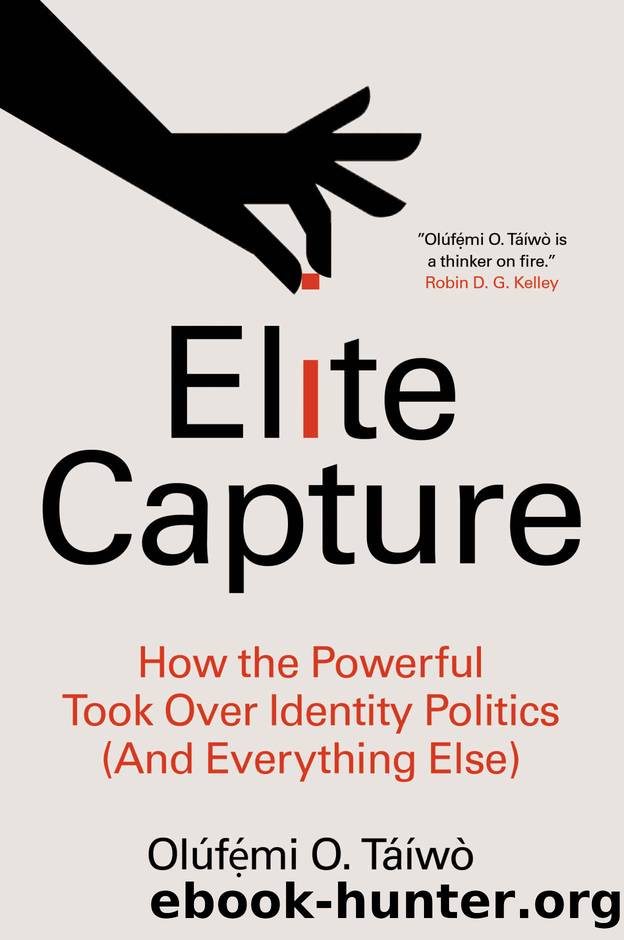Elite Capture by Olúfẹ́mi O. Táíwò

Author:Olúfẹ́mi O. Táíwò [Táíwò, Olúfẹ́mi O.]
Language: eng
Format: epub
Publisher: Haymarket Books
Published: 2022-05-03T11:00:00+00:00
Better Blueprints
Deference politics is right about the what: it does in fact matter that we pay attention to lived experiences, and it is politically important that we pay attention to difference. But it is wrong about the how, because the more we focus on changing our norms of interactions to ones that locally and cosmetically elevate the voices and perspectives in the room, the harder it becomes to change the world outside of the room.
As philosopher C. Thi Nguyen reminded us in the last chapter, the power of the system is that of the game designer. It builds our social, economic, cultural, and even attentional environment in ways that get us to follow its game plan.
In the speech I quoted at the beginning of this chapter, AmÃlcar Cabral explains another important aspect of this systemic control: â[I]mperialist domination . . . for its own security, requires cultural oppression and the attempt at direct or indirect liquidation of the essential elements of the culture of the dominated people.â Culture, for Cabral, is our collective ability to design and organize our own lives, and be the engines of our own historyâan ability that conflicts directly with the aims of imperialists to be the ones doing the designing and controlling. This is why, âwhatever may be the material aspects of this domination,â imperialist domination can survive âonly by the permanent, organized repression of the cultural life of the people concerned.â29
This, above all, illustrates the key problem with deference: it focuses the very capacity that we have to reconstruct the whole house to the specific rooms that have already been built for us. It advertises itself as deferring to marginalized voices and perspectives, but in conceding so much creative space to the blueprint of society, it is perhaps better understood as deference to the built structure of society.
I am arguing here for another approachâone that concedes that we have to start with the interactions that we have most control over, but that keeps in view the point of changing how those interactions go: to rebuild the whole of society, not just our interactions. Rooting ourselves here thus gives us a constructive politics.
A constructive politics pursues specific goals or end results, rather than aiming to avoid âcomplicityâ in injustices that we assume will mostly persist anyway. If itâs âepistemologyâ or knowledge practices weâre concerned about, then a constructive politics focuses on institutions and practices of information gathering that are strategically useful for challenging social injustices themselves, not just the symptoms manifest in the room we happen to be in today.
In general, a constructive politics is one that engages directly in the task of redistributing social resources and powe,r rather than pursuing intermediary goals cashed out in symbols.
This is a demanding approach. It asks that we swim upstream, that we be accountable and responsive to people who arenât yet in the room, and that we build the kinds of rooms in which we can sit together, rather than merely seek to navigate more gracefully the rooms history has built for us.
Download
This site does not store any files on its server. We only index and link to content provided by other sites. Please contact the content providers to delete copyright contents if any and email us, we'll remove relevant links or contents immediately.
Harry Potter and the Goblet Of Fire by J.K. Rowling(3046)
Never by Ken Follett(2881)
Shadow of Night by Deborah Harkness(2718)
Ogilvy on Advertising by David Ogilvy(2682)
Zero to IPO: Over $1 Trillion of Actionable Advice from the World's Most Successful Entrepreneurs by Frederic Kerrest(2396)
The Man Who Died Twice by Richard Osman(2300)
Machine Learning at Scale with H2O by Gregory Keys | David Whiting(2291)
Book of Life by Deborah Harkness(2263)
How Proust Can Change Your Life by Alain De Botton(2261)
My Brilliant Friend by Elena Ferrante(2224)
0041152001443424520 .pdf by Unknown(2220)
The Tipping Point by Malcolm Gladwell(2204)
How to Pay Zero Taxes, 2018 by Jeff A. Schnepper(2100)
Will by Will Smith(2042)
Purple Hibiscus by Chimamanda Ngozi Adichie(1982)
Hooked: A Dark, Contemporary Romance (Never After Series) by Emily McIntire(1959)
Borders by unknow(1785)
Rationality by Steven Pinker(1765)
Daughter of Smoke and Bone by Laini Taylor(1744)
